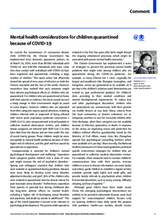Displaying 61 - 70 of 195
The purpose of this study was to capture the association of exposure to prolonged separation from both parents early in life and allostatic load (AL), a measure of biological multi-system dysregulation.
The current study used a longitudinal design to explore how perceived discrimination is associated with psychosocial functioning (i.e., depressive symptoms and social initiative) over time in Chinese rural left-behind adolescents.
The current study examined the attachment development of 92 internationally adopted Chinese girls, focusing on the influence of type of pre-adoption care (institutional versus foster care) and sensitive adoptive parenting.
This study investigated depressive and anxiety symptoms among students in Hubei province, China, which can help optimize interventions on the mental health of children for stakeholders in all countries affected by COVID-19.
The purpose of this study is to evaluate the neglect of left-behind children (LBC) in China.
Based on the life history theory and the interpersonal function model of non-suicidal injury (NSSI), this study aimed to examine the positive impact of loneliness on friendship quality via NSSI among left-behind adolescents.
This comment from the Lancet reviews the implications of the COVID-19 crisis on children's mental health, including children who are separated from their caregivers.
The present research contains two studies: in Study 1 the authors compared prosocial behavior between emerging adults with left-behind experience (EA-LB) and their non-left-behind counterparts; in Study 2, the authors, adopting a sub-sample of Study 1, examined the direct and interactive effects of parental autonomy support, mindfulness, and gender on prosocial behavior in EA-LB.
This study examines the psychosocial impact of rural-to-urban migration on youth in China, a fast-urbanizing country with 268 million rural migrant workers and 103 million migrant youth. Using data from 2012 China Family Panel Studies (n = 2084, age 10–15), this study examines psychosocial disparities (depressive symptoms, social relationships, and future aspirations) among youth migrated with parents, youth left behind by migrant parents, and their peers.
The authors of this article investigated the associations of individual- and family-related factors with psychological distress in a sample of left-behind children (LBC) aged 10–15 using logistic regression. A total of 954 LBC were included in the study.

